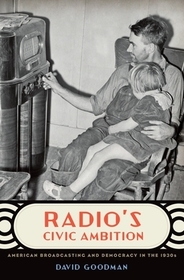
Radio's Civic Ambition
American Broadcasting and Democracy in the 1930s
-
10% KEDVEZMÉNY?
- A kedvezmény csak az 'Értesítés a kedvenc témákról' hírlevelünk címzettjeinek rendeléseire érvényes.
- Kiadói listaár GBP 83.00
-
39 653 Ft (37 765 Ft + 5% áfa)
Az ár azért becsült, mert a rendelés pillanatában nem lehet pontosan tudni, hogy a beérkezéskor milyen lesz a forint árfolyama az adott termék eredeti devizájához képest. Ha a forint romlana, kissé többet, ha javulna, kissé kevesebbet kell majd fizetnie.
- Kedvezmény(ek) 10% (cc. 3 965 Ft off)
- Kedvezményes ár 35 688 Ft (33 989 Ft + 5% áfa)
Iratkozzon fel most és részesüljön kedvezőbb árainkból!
Feliratkozom
39 653 Ft

Beszerezhetőség
Megrendelésre a kiadó utánnyomja a könyvet. Rendelhető, de a szokásosnál kicsit lassabban érkezik meg.
Why don't you give exact delivery time?
A beszerzés időigényét az eddigi tapasztalatokra alapozva adjuk meg. Azért becsült, mert a terméket külföldről hozzuk be, így a kiadó kiszolgálásának pillanatnyi gyorsaságától is függ. A megadottnál gyorsabb és lassabb szállítás is elképzelhető, de mindent megteszünk, hogy Ön a lehető leghamarabb jusson hozzá a termékhez.
A termék adatai:
- Kiadó OUP USA
- Megjelenés dátuma 2011. május 5.
- ISBN 9780195394085
- Kötéstípus Keménykötés
- Terjedelem368 oldal
- Méret 236x163x30 mm
- Súly 576 g
- Nyelv angol
- Illusztrációk 29 photographs 0
Kategóriák
Rövid leírás:
In its golden age, American radio both entertained and also fostered programs meant to produce self-governing and opinion-forming individuals, promoting openness to change and tolerance of diversity, familiarity with classical music, and knowledge of world affairs. As author David Goodman argues, the ambitions of radio's golden age have strong significance today as evidence that media regulation in the public interest can have significant and often positive effects.
TöbbHosszú leírás:
The history of American radio broadcasting has often been written as a lament for lost possibilities, a tale of what might have been. One now familiar landmark in that account is the story of how American commercial broadcasters, in the passage of the 1934 Communications Act, won a great victory over reformers who wanted frequencies set aside for non-commercial use. It is generally agreed that the defeat of the radio reformers was decisive and permanent, and that the best hopes for a public radio in the United States had been thwarted by 1934. In Radio's Civic Ambition, however, author David Goodman focuses not on the lost possibilities and defeated reformers, but on what did happen as the beginning of another chapter in the story of the struggle over the meaning and purpose of American broadcasting. Commercial broadcasters paid a considerable price for their victory: in the years after 1934, American broadcasters always had to be seen to be providing public service as well as entertainment. An impressive range of programs, from imaginatively conceived classical music broadcasts to lively multi-opinion radio forums, was designed to promote civic engagement and individualization. By the later 1930s, political leaders, key social science and communications intellectuals, the Federal Communications Commission, and many articulate and educated ordinary Americans, increasingly expected commercial broadcasters in the US to perform a range of ambitious civic functions, including encouraging local community, strengthening democracy, fostering talent, and producing tolerance for other points of view.
A new look at the history of commercial radio broadcasting in America, Radio's Civic Ambition will appeal to students and scholars in communications and radio studies, music history, media studies, and American history.
Goodman's book provides a great look at how the American broadcasting industry in the 1930s was civic-minded as well as responsive to government.
Tartalomjegyzék:
About the Companion Website
Preface
Part 1: Ambition
: The American System
: The Civic Paradigm
: The Promise of Broadcast Classical Music
: Democratic Radio
Part 2: Division
: Class, Cosmopolitanism and Division
: Radio and the intelligent listener - the War of the Worlds panic
: Populism, war and the American system
Postlude: From Toscanini to Sinatra
Conclusion




